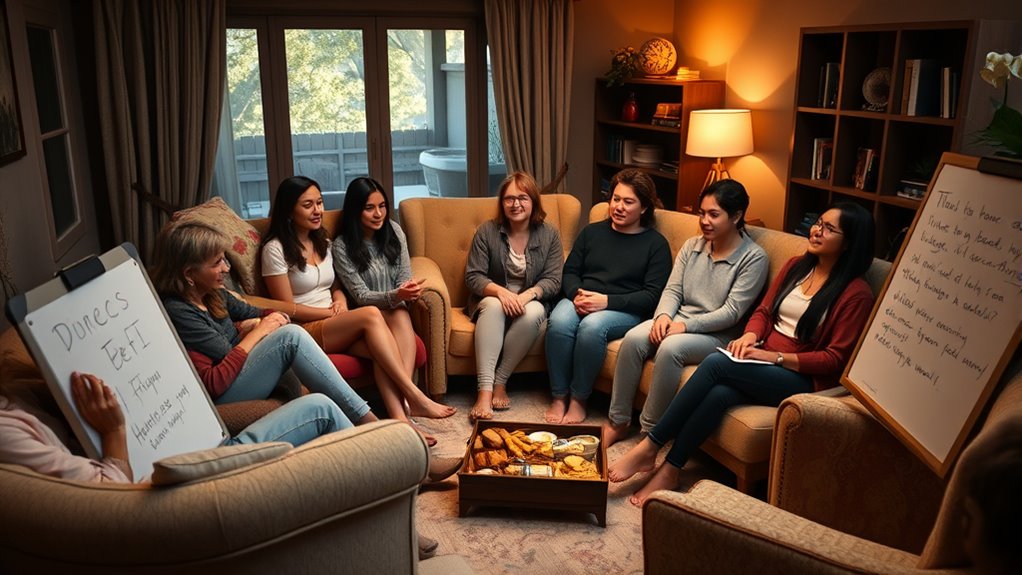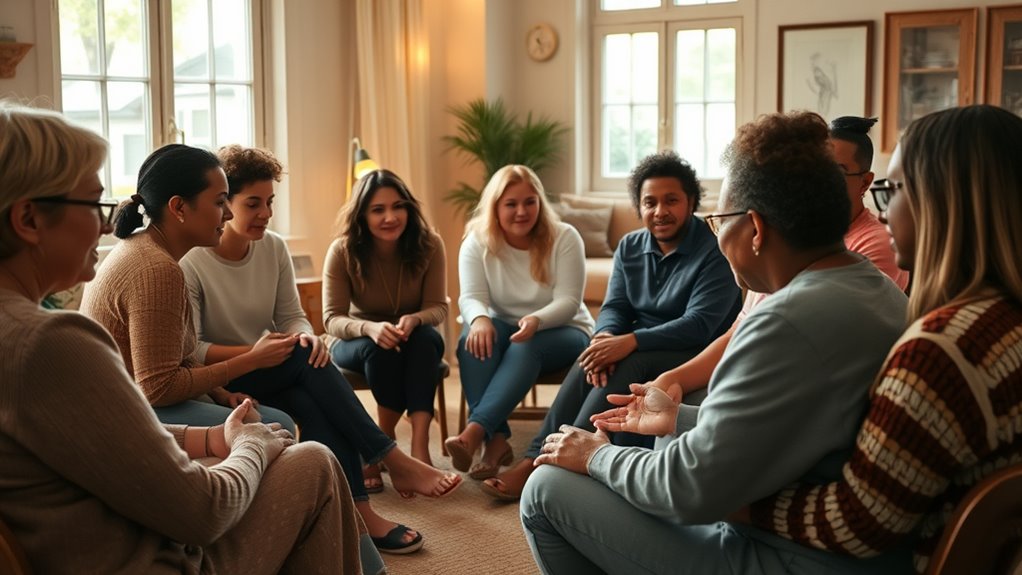Joining a divorce support group offers emotional comfort and validation, helping you feel less lonely and more connected. It provides practical advice on legal, financial, and personal issues while sharing resources and coping strategies. These groups also foster spiritual growth and build a positive outlook, encouraging hope and resilience. You’ll develop new skills, improve communication, and gain confidence in managing challenges. Keep exploring to discover how support groups can truly help you navigate this difficult chapter.
Key Takeaways
- Provides emotional comfort, validation, and reduces loneliness in a safe, nonjudgmental environment.
- Facilitates sharing practical advice, resources, and professional recommendations for legal and financial matters.
- Supports spiritual growth, resilience, and a positive outlook through faith-based discussions.
- Builds social connections and friendships, expanding support networks to combat isolation.
- Enhances coping skills, emotional regulation, and confidence to navigate future relationships effectively.

Divorce support groups offer a crucial space where you can find emotional comfort, practical guidance, and a sense of belonging during a challenging change. When facing the upheaval of divorce, it’s easy to feel isolated, but being part of a group with others who understand your experience can make a significant difference. Sharing your feelings in a safe, nonjudgmental environment helps validate your emotions and normalizes what you’re going through. You realize you’re not alone, and this connection can provide solace amid the chaos. Knowing others are steering through similar struggles reassures you that healing is possible, reducing feelings of loneliness and fostering emotional resilience. Research indicates that participation in faith-based groups can also promote ongoing spiritual growth and resilience. Engaging in a support group also delivers tangible mental health benefits. As you listen to others’ stories and share your own, you may notice a decrease in feelings of depression often associated with divorce. Recognizing that your emotions are common helps you better understand your mental health and encourages you to seek professional help if needed. The group setting teaches coping strategies to manage grief, sadness, and stress more effectively. Through shared experiences, you learn to rebuild your emotional strength and develop healthier ways to handle future challenges. Regular participation can promote ongoing mental health improvement by normalizing your feelings and offering continuous support. Support groups are valuable sources of practical advice and resource sharing. Members often exchange insights on legal and financial issues, such as custody arrangements and support payments, saving you time and reducing stress. You can get recommendations for trusted professionals like lawyers or therapists, and access helpful books, articles, or online resources. This collective knowledge equips you with the information needed to steer through complex divorce-related matters confidently. By learning from others’ experiences, you avoid common pitfalls and feel more empowered to make informed decisions. If your support group has a faith-based component, it can also bolster your spiritual growth during this difficult time. Many groups emphasize forgiveness, spiritual recalibration, and finding meaning or hope through faith. These discussions foster a positive outlook and help you develop emotional balance rooted in your beliefs. This spiritual reinforcement can be a vital part of healing, providing comfort and guiding you toward personal growth. Beyond emotional and practical support, divorce groups foster social connection and a sense of belonging. Building new friendships expands your support network, helping you combat social isolation. These relationships often continue beyond the group, offering ongoing encouragement and companionship. As you reintegrate into social life, you gain opportunities for new connections and experiences that contribute to your overall well-being. Feeling part of a community reassures you that you’re supported, making the path forward less intimidating. Finally, support groups help you develop essential skills. You improve communication with ex-partners, children, and others, while gaining tools to manage stress and emotional regulation. The structured guidance from trained facilitators ensures discussions are productive, fostering a safe environment for growth. Participants learn to set boundaries, focus energy constructively, and build confidence in their ability to handle future relationships. This sense of control and empowerment can transform your outlook, helping you move forward with resilience and hope. Additionally, understanding the mental health benefits associated with participation can motivate continued involvement and personal growth throughout your healing journey.
Frequently Asked Questions
How Do I Find a Local Divorce Support Group?
To find a local divorce support group, start by searching online directories like DivorceCare’s website or Psychology Today’s listings, filtering by your city or zip code. Use Meetup.com for informal gatherings and check church or community center websites for in-person or virtual groups. Call organizations directly to confirm details, ask about costs, and verify if the group matches your needs, such as faith-based or gender-specific support.
Are Online Support Groups as Effective as In-Person Ones?
Online support groups are just as effective as in-person ones, like two sides of the same coin. They provide valuable emotional support, help you build coping skills, and improve mental health. While online groups offer flexibility and anonymity, in-person groups excel at fostering deep connections and nonverbal communication. Both formats can lead to positive, long-term outcomes, so choose what fits your needs and lifestyle best.
What Should I Expect During My First Support Group Meeting?
During your first support group meeting, you can expect a warm welcome and an overview of the program. You’ll introduce yourself and share how you’re feeling, while the facilitator sets ground rules for confidentiality and respect. Expect a mix of expert presentations and group discussions focused on personal experiences. The environment is designed to be safe and supportive, with options for emotional comfort like tissues and calming symbols.
Can Support Groups Help With Co-Parenting Challenges?
Support groups can truly help you navigate co-parenting challenges. They provide a safe space to share experiences, learn effective communication strategies, and gain peer advice—all vital for reducing conflict. As you participate, you’ll discover practical tools to foster cooperation and stability for your children. While they’re not a cure-all, these groups often boost your confidence and problem-solving skills, making co-parenting more manageable and less stressful.
How Long Should I Attend a Divorce Support Group?
You should attend a divorce support group as long as you find it helpful and comfortable. Typically, programs last around 10-12 weeks, but you can stay longer if you feel ongoing support is needed. Listen to your personal progress and needs—there’s no strict timeline. If you’re no longer benefiting or feel ready to move on, it’s okay to stop. Your well-being is the priority.
Conclusion
Joining a divorce support group could be the single most life-changing decision you’ll ever make. It’s like discovering a secret superpower that instantly turns heartbreak into hope, loneliness into friendship, and chaos into clarity. You’ll feel unstoppable, knowing you’re never alone in this battle. So, don’t wait—embrace the support, unbolt your inner strength, and watch your life transform faster than you ever thought possible. Your new beginning is just one support group away!










